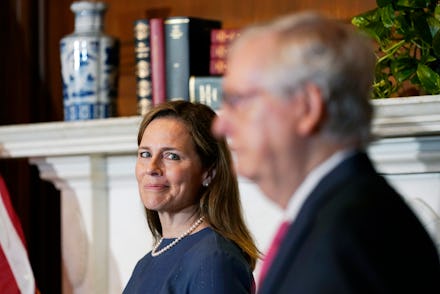Trump pulls the plug on much-needed coronavirus relief, saying it'll be passed "after I win"

One day after President Trump returned home from Walter Reed medical center with an active COVID-19 infection, he announced that coronavirus relief talks would come to a lurching halt. In a Twitter post Tuesday afternoon, Trump explained his reasoning. According to the president, Democrats were demanding too much in relief negotiations, much of which he believed would assist "poorly run, high crime, Democrat states." Given that Democratic leaders like House Speaker Nancy Pelosi (D-Calif.) weren't negotiating in what he calls "good faith," the president has instructed Republicans — whom he referred to as "my representatives" — to halt relief conversations until after Election Day.
"Clearly, the White House is in complete disarray," Pelosi said in a statement responding to the president's announcement. The Democratic leader went further to say that Trump is "putting himself first at the expense of the country, with the full complicity of the GOP members of Congress." Pelosi had been in talks with Treasury Secretary Steven Mnuchin on another relief bill for Americans struggling to deal with the fallout of the ongoing coronavirus pandemic.
Trump is relying on Republicans to fall in line in delaying needed relief until after he is re-elected. "I have instructed my representatives to stop negotiating until after the election when, immediately after I win, we will pass a major stimulus bill that focuses on hardworking Americans and small business," Trump tweeted. "I have asked [Senate Majority Leader] Mitch McConnell not to delay, but to instead focus full time on approving my outstanding nominee to the United States Supreme Court, Amy Coney Barrett."
"Our economy is doing very well," Trump added. In fact, the economy is not doing very well, with the latest jobs report showing the recovery is slowing and that Trump is in danger of being the first U.S. president to leave office with fewer American jobs than when he entered office if he loses in November.
In trading much-needed coronavirus relief for an attempt to ram through his third Supreme Court nominee, Trump is essentially choosing to let people go hungry, lose their homes, and even die in order to further his political agenda. His nomination of Barrett, announced in late September after the death of Justice Ruth Bader Ginsburg, defies the precedent set by McConnell himself that Supreme Court nominees should not be considered in an election year.
Then again, none of this is all that surprising. At every turn, Republicans have refused to take direct and necessary action to save lives, starting with the fact that Trump knew about the virus's mortality long before he admitted it to the American public. Back in May, the Democrat-controlled House of Representatives passed the HEROES Act, which offered $3 trillion in relief including protective equipment, hazard pay for workers, and an additional round of direct payments to Americans. The GOP-controlled Senate has no plans to vote on it, and the two parties have never really come close on a deal.